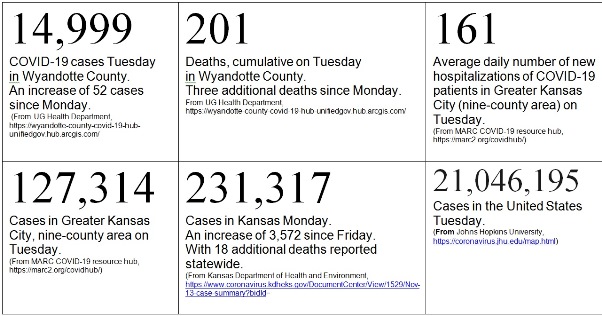
COVID-19 long-haulers, those who have symptoms for months, can be found throughout the population.
Dr. Michael Rippee, sports neurologist, said on Tuesday morning’s news conference at the University of Kansas Health System that he’s starting to see some COVID-19 long-hauler patients suffering from brain fog and chronic headaches.
Dr. Rippee said there are similarities between the athletes he treats who have concussions and some of the COVID-19 patients with chronic headaches and brain fog.
What happens in brain fog is that people become slower processing information, according to Dr. Rippee. While some patients have brain fog for a few weeks, others may have it for a half-year after getting COVID-19.
The brain fog could be related to the inflammatory process, according to the doctors. Because it’s not an actual direct infection of the nervous system, it can improve after a period of time.
Speech and cognitive therapy may be beneficial for some long-haulers with brain fog, according to Dr. Rippee. However, there isn’t a medication that will reverse it.
Dr. Dana Hawkinson, medical director of infection prevention and control at KU Health System, said the health system will be starting a Long Haul Clinic soon for patients who have COVID-19 effects over a long period of time.
The patients in this clinic will be referred by a primary care doctor, then have access to coordinated care with different specialists to manage post-COVID-19 symptoms.
In other discussion, Dr. Hawkinson said that the two different COVID-19 vaccines now in use in the United States should be about the same level of effectiveness. The two vaccines are equivalent, he said, and data is still being gathered on them.
Dr. Steve Stites, chief medical officer at KU Health System, said if someone calls you to tell you a vaccine is ready, don’t wait on the other one being available. The doctors consider them about equivalent. Dr. Stites said he was vaccinated with the Moderna vaccine on Monday because that’s what they had in supply when it was his turn.
The doctors at Tuesday’s news conference all agreed that they had little or no problems with their vaccines. Dr. Rippee had a sore shoulder, as did Dr. Hawkinson and Dr. Stites. Dr. Hawkinson said common after-effects of the COVID-19 vaccine for some people include headache, pain at the injection site, fatigue and malaise. Those should go away in two to three days.
The vaccines should still work on a new strain of COVID-19 being reported throughout the world and in the United States, according to the doctors. This strain is thought to spread more easily. Social distancing and mask-wearing are important with the virus.
The KU Health System reported COVID-19 inpatient case numbers were holding steady on Tuesday morning, and 70 active COVID-19 patients were hospitalized, the same number as Monday, according to Dr. Hawkinson. There were 29 patients in the intensive care unit, an increase of one from Monday. Fourteen of the ICU patients were on ventilators, a decrease of one from Monday. In addition, 56 others were still hospitalized from COVID-19 in the recovery phase, no change from Monday. There were a total 126 COVID-19 patients hospitalized, the same as Monday.
Case numbers reported
Wyandotte County reported an increase of 52 COVID-19 cases on Tuesday, Jan. 5, according to the Unified Government’s COVID-19 webpage. There were a cumulative 14,999 cases. There were three additional deaths reported Tuesday, for a cumulative total of 201.
The Mid-America Regional Council Kansas City Region COVID-19 hub on Tuesday reported 127,314 total cumulative cases, with, 1,529 total cumulative deaths in the nine-county Kansas City region. The average number of new hospitalizations was 161.
The Johns Hopkins University COVID-19 dashboard on Tuesday reported 21,046,195 total cumulative cases in the United States, with 357,258 total deaths.
Free COVID-19 testing available Wednesday
The Unified Government Health Department’s COVID-19 test site at the former Kmart building at 78th and State will be open on Wednesday, Jan. 6, with testing from 9 a.m. to 3 p.m.
Tests are free for those who live or work in Wyandotte County. The tests are nasopharyngeal swab tests. The Health Department no longer uses saliva tests.
The tests now are open to asymptomatic people as well as those who have symptoms or have been exposed to COVID-19. Check with the UG Health Department’s Facebook page to see if there have been any changes in the schedule. Bring something that shows that you live or work in Wyandotte County, such as a utility bill.
More COVID-19 tests will be available Wednesday at the Pierson Community Center, 1800 S. 55th St., Kansas City, Kansas. These tests are through WellHealth Management. For more information and to schedule a test, visit www.GoGetTested.com/Kansas.
Testing sites are at https://wyandotte-county-covid-19-hub-unifiedgov.hub.arcgis.com/pages/what-to-do-if-you-think-you-have-covid-19.
For more information about the testing site at the former Kmart location, visit https://alpha.wycokck.org/files/assets/public/health/documents/covid/10092020_newtestingsitewyco.pdf.
The KU doctors’ news conference is at https://www.facebook.com/kuhospital/videos/740055530264373.
To see information about the UG giving vaccines to health care workers, visit https://wyandotteonline.com/ug-to-start-giving-covid-19-vaccines-to-health-department-and-ems-personnel-next-week/.
The KDHE vaccine report is at https://www.coronavirus.kdheks.gov/DocumentCenter/View/1708/COVID-19-Vaccine-Updates–123020-FINAL-PDF?bidId=.
Cards and letters of encouragement for caregivers at KU Health System may be sent to Share Joy, care of Patient Relations, 4000 Cambridge St., Mailstop 1021, Kansas City, Kansas, 66160. Emails can be sent to ShareJoy@kumc.edu.
Wyandotte County is under a mandatory mask and social distancing order. Also, the Wyandotte County health order with a limit of 10 persons to a gathering, and a closing time of 10 p.m. for restaurants and bars, with other new restrictions, is at https://alpha.wycokck.org/files/assets/public/health/documents/covid/11162020localhealthorderexecuted.pdf.
The UG COVID-19 webpage is at https://alpha.wycokck.org/Coronavirus-COVID-19-Information.
The KDHE’s COVID-19 webpage is at https://www.coronavirus.kdheks.gov/.
The KC Region COVID-19 Hub dashboard is at https://marc2.org/covidhub/.
The Wyandotte County page on the Johns Hopkins COVID-19 website is at https://bao.arcgis.com/covid-19/jhu/county/20209.html.
